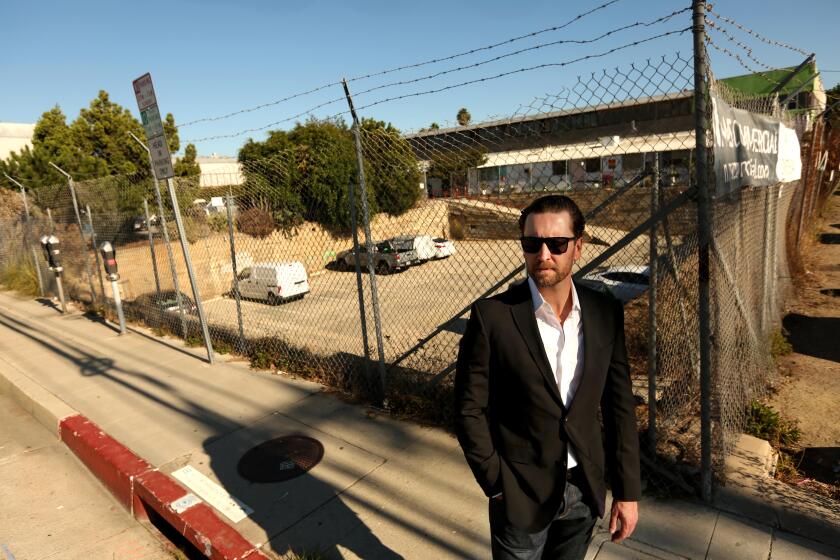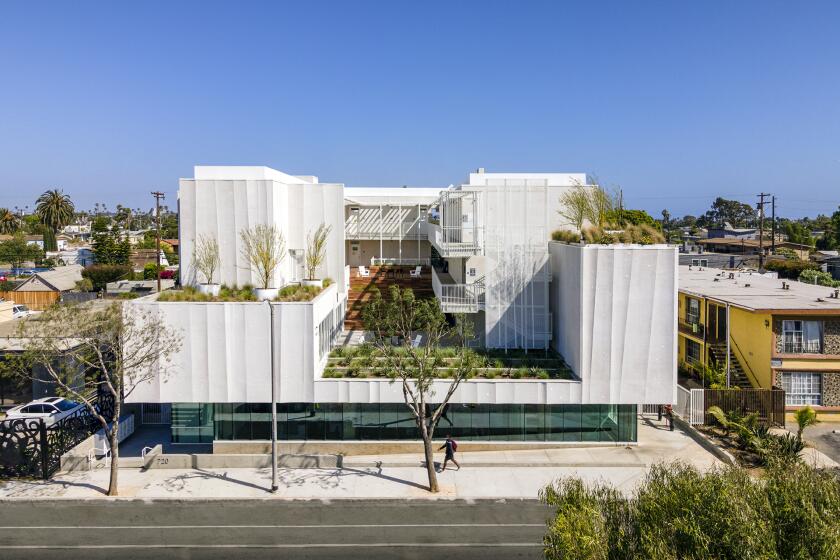Beverly Hills is dragging its heels on a development with affordable apartments. The governor says: Build it

- Share via
California officials are turning the screws on the city of Beverly Hills, where approval of a new hotel and apartment complex is moving too slowly for state housing bosses and the governor.
The lightning rod is a planned mixed-use development near Wilshire Boulevard that has been brought forth under a state law intended to force cities to add more housing whether they like the proposals or not.
The 19-story building on Linden Drive by local developer Leo Pustilnikov would be big by Beverly Hills standards and include a 73-room hotel and restaurant on the first five floors. Plans call for the higher floors to contain 165 apartments including 33 units reserved for rental to lower-income households.
The project so far has failed to pass muster with city planning leaders, who say Pustilnikov hasn’t provided all the details about the project that the city requires to consider approval.
Pustilnikov has pioneered a novel interpretation of a state law known as the “builder’s remedy” to push cities to allow development projects at a size and scale otherwise barred under zoning rules.
Developers in Santa Monica are planning 4,500 new apartments under a little-known state legal provision — and the city might not be able to stop them.
As part of their efforts to tackle California’s housing shortage and homelessness crisis, legislators recently beefed up the law, by giving developers leverage to get large proposals approved so long as they set aside a percentage for low-income residents.
Last month the state Department of Housing and Community Development backed Pustilnikov in a “notice of violation” to the city, saying it was violating state housing laws by holding up the project.
“The City Council should reverse its decision and direct city staff to process the project without further delay,” the state notice said, referring to a council vote in June to delay the approval process.
Gov. Gavin Newsom piled on in a statement, saying that the city is violating the law by “blocking” the proposal and referring to opponents of the project as NIMBYs — a highly charged acronym for “not in my backyard” that refers to homeowners who resist development projects in their neighborhoods.
“We can’t solve homelessness without addressing our housing shortage,” the governor said. “Now is a time to build more housing, not cave to the demands of NIMBYs.”
Beverly Hills already faced pressure to approve the Linden project before the state’s letter. In June, Californians for Homeownership, a nonprofit affiliated with the California Assn. of Realtors, sued the city in Los Angeles County Superior Court for not advancing the development.
Some residents in the neighborhood south of Wilshire Boulevard are up in arms about the scale of the project that is designated to fill a parking lot at 125-129 S. Linden Drive between a five-story office building and low-rise apartment buildings.
“None of us are opposed to affordable housing,” said Kenneth A. Goldman, president of the Southwest Beverly Hills Homeowners Assn., but “you don’t have to be a NIMBY to say that’s just so far out of line.”
It would be almost four times taller than the five-story height limit the city has on its books and could threaten the neighborhood’s “quiet lifestyle,” Goldman said. The construction period would be “hell,” he added.
The city has until Sept. 20 to respond to state housing officials and indicated in a statement that the delay was due in part to Pustilnikov changing the original all-residential proposal to include the hotel. It is a switch that could offer a financial coup for the developer in a tourist-friendly city, where getting permission to build a new hotel is a tall order.
Last year Beverly Hills voters decided to rescind the City Council’s approval of an ultra-opulent hotel called Cheval Blanc on the edge of Rodeo Drive after French luxury retailer LVMH spent millions of dollars planning the project.
Of the Linden Drive proposal, the city said in a statement, “The project has not been denied.”
“What was originally submitted as a purely residential project has now morphed into a 73-room hotel and restaurant project with 35 fewer residential units, including a reduction of 7 affordable units,” it said.
When the application is complete, the city said, a public hearing will be held, followed by Planning Commission review and potential approval by the City Council.
By excluding single-family zones from affordable housing incentive programs, L.A. leaders are squandering the potential to transform the city into one that works for people of all income levels.
That process may be complicated by Pustilnikov’s stated intention to sell his interest in the Linden Drive property as part of a Chapter 11 bankruptcy proceeding involving another of his real estate projects.
In 2018, Pustilnikov purchased a 50-acre parcel on the Redondo Beach waterfront that is the site of a defunct power plant. The property is controlled by entities owned by Pustilnikov and a business partner, Ely Dromy. Using the builder’s remedy law, the pair has advanced a massive mixed-use project for the site with 2,700 apartments as its centerpiece. In court documents, Pustilnikov estimates that the development, if completed, would be worth $600 million.
The effort has been stymied amid fights with the city of Redondo Beach, the California Coastal Commission and AES Corp., the owner of the power plant. In late 2022, AES threatened to foreclose on Pustilnikov. To stave that off, one of the entities that own the site filed for bankruptcy.
In a recent filing in the case, Pustilnikov and Dromy said they will sell the Linden property for $27.5 million to help preserve their ownership of the power plant site.
However, a representative for Pustilinkov, Adam Englander, said in a statement that is not necessarily the case.
Instead, more investors may be brought in to the Redondo Beach property and a developer with luxury hotel experience may become a partner in the Linden project, Englander said.
“It is not anticipated,” Englander said, that the Linden project “in its current form will be sold prior to completion.”
Pustilnkov has put forward plans to build nearly 3,500 apartment units — 700 of them dedicated as low-income — across a dozen projects in Beverly Hills, Redondo Beach, Santa Monica and West Hollywood under the builder’s remedy. The Linden project is one of seven he’s planning in Beverly Hills alone.
The builder’s remedy provides few avenues for city councils to deny the developments. But because it’s legally untested and separate state environmental laws still apply, projects are not a slam dunk. None of Pustilnikov’s proposals have been approved.
Cities are subject to the law if they do not have state-approved blueprints for future growth. Every eight years, the state requires communities to design a zoning plan accommodating specific numbers of new homes, including those set aside for low- and moderate-income families.
In the current eight-year cycle, Beverly Hills struggled to get a plan that passed muster. Elected officials and residents balked at the city’s requirement to make space for 3,104 homes, saying that doing so would unalterably change the community’s character.
The city blew multiple deadlines and was sued by Californians for Homeownership. In December, an L.A. County Superior Court judge ruled that Beverly Hills could no longer issue any building permits — including those for pools, kitchen and bathroom remodels and other renovations — because of its failure.
The city appealed the ruling and continued to process permits in the meantime, but the decision sparked alarm among civic leaders. In May, the state approved a revised housing plan for Beverly Hills, ending the threat of the permit moratorium.
More to Read
Inside the business of entertainment
The Wide Shot brings you news, analysis and insights on everything from streaming wars to production — and what it all means for the future.
You may occasionally receive promotional content from the Los Angeles Times.














